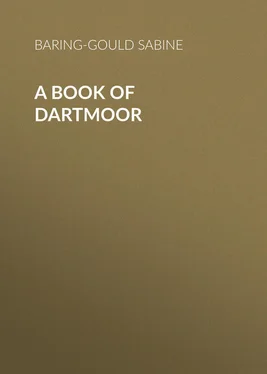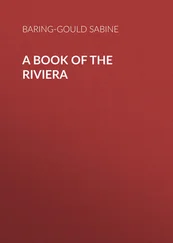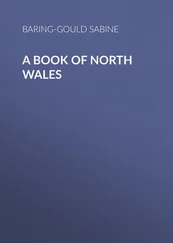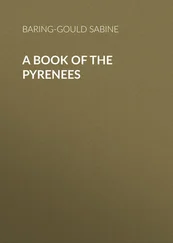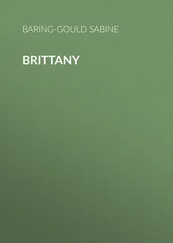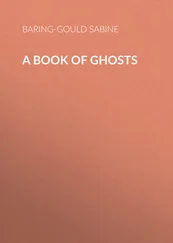Sabine Baring-Gould - A Book of Dartmoor
Здесь есть возможность читать онлайн «Sabine Baring-Gould - A Book of Dartmoor» — ознакомительный отрывок электронной книги совершенно бесплатно, а после прочтения отрывка купить полную версию. В некоторых случаях можно слушать аудио, скачать через торрент в формате fb2 и присутствует краткое содержание. Жанр: foreign_antique, foreign_prose, на английском языке. Описание произведения, (предисловие) а так же отзывы посетителей доступны на портале библиотеки ЛибКат.
- Название:A Book of Dartmoor
- Автор:
- Жанр:
- Год:неизвестен
- ISBN:нет данных
- Рейтинг книги:5 / 5. Голосов: 1
-
Избранное:Добавить в избранное
- Отзывы:
-
Ваша оценка:
- 100
- 1
- 2
- 3
- 4
- 5
A Book of Dartmoor: краткое содержание, описание и аннотация
Предлагаем к чтению аннотацию, описание, краткое содержание или предисловие (зависит от того, что написал сам автор книги «A Book of Dartmoor»). Если вы не нашли необходимую информацию о книге — напишите в комментариях, мы постараемся отыскать её.
A Book of Dartmoor — читать онлайн ознакомительный отрывок
Ниже представлен текст книги, разбитый по страницам. Система сохранения места последней прочитанной страницы, позволяет с удобством читать онлайн бесплатно книгу «A Book of Dartmoor», без необходимости каждый раз заново искать на чём Вы остановились. Поставьте закладку, и сможете в любой момент перейти на страницу, на которой закончили чтение.
Интервал:
Закладка:
When lighted on, it has the appearance of a handful of emeralds or aqua marine thrown into a dark hole, and is frequently associated with the bright green liverwort. Parfitt, in his Moss Flora of Devon , gives it as osmundacea , not as pennata . It was first discovered in Britain by a Mr. Newberry, on the road from Zeal to South Tawton; it is, however, to be found in a good many places, as Hound Tor, Widdecombe, Leather Tor, and in the Swincombe valley, also in a cave under Lynx Tor. If found, please to leave alone. Gathered it is invisible; the hand or knife brings away only mud.
But what all are welcome to go after is that which is abundant on every moorside – but nowhere finer than on such as have not been subjected to periodical "swaling" or burning. I refer to the whortleberry. This delicious fruit, eaten with Devonshire cream, is indeed a delicacy. A gentleman from London was visiting me one day. As he was fond of good things, I gave him whortleberry and cream. He ate it in dead silence, then leaned back in his chair, looked at me with eyes full of feeling, and said, "I am thankful that I have lived to this day."
The whortleberry is a good deal used in the south of France for the adulteration and colouring of claret, whole truck-loads being imported from Germany.
There is an interesting usage in my parish, and I presume the same exists in others. On one day in summer, when the "whorts" are ripe, the mothers unite to hire waggons of the farmers, or borrow them, and go forth with their little ones to the moor. They spend the day gathering the berries, and light their fires, form their camp, and have their meals together, returning late in the evening, very sunburnt, with very purple mouths, very tired maybe, but vastly happy, and with sufficient fruit to sell to pay all expenses and leave something over.
If the reader would know what minerals are found on Dartmoor he must go elsewhere.
I have a list before me that begins thus: "Allophane, actinolite, achroite, andalusite, apatite " – but I can copy out no more. I have often found appetite on Dartmoor, but have not the slightest suspicion as to what is apatite. The list winds up with wolfram, about which I can say something. Wolfram is a mineral very generally found along with tin, and that is just the "cussedness" of it, for it spoils tin.
When tin ore is melted at a good peat fire, out runs a silver streak of metal. This is brittle as glass, because of the wolfram in it. To get rid of the wolfram the whole has to be roasted, and the operation is delicate, and must have bothered our forefathers considerably. By means of this second process the wolfram, or tungsten as it is also called, is got rid of.
Now, it is a curious fact that the tin of Dartmoor is of extraordinary purity; it has little or none of this abominable wolfram associated with it, so that it is by no means improbable that the value of tin as a metal was discovered on Dartmoor, or in some as yet unknown region where it is equally unalloyed.
In Cornwall all the tin is mixed with tungsten. Now this material has been hitherto regarded as worthless; it has been sworn at by successive generations of miners since mining first began. But all at once it has leaped into importance, for it has been discovered to possess a remarkable property of hardening iron, and is now largely employed for armour-plated vessels. From being worth nothing it has risen to a rapidly rising value, as we are becoming aware that we shall have to present impenetrable sides to our Continental neighbours.
Dartmoor comprises the "forest" and the surrounding commons, as extensive together as the forest itself. "What have you got on you, little girl?" asked a good woman of a shivering child. "Please, mem, first there's a jacket, then a gownd, and then comes Oi." So with Dartmoor. First come the venville parishes, next their extensive commons, and "then comes Oi," the forest itself.
The venville parishes are all moorland parishes – Belstone, Throwleigh, Gidleigh, Chagford, North Bovey, Manaton, Widdecombe, Holne, Buckfastleigh, Dean Prior, South Brent, Shaugh, Meavy, Sheeps Tor, Walkhampton, Sampford Spiney, Whitchurch, Peter Tavy, Lydford, Bridestowe, Sourton. There are others, standing like the angel of the Apocalypse, with one foot on the moorland, the other steeped in the green waves of foliage of the lowlands; such are South Tawton, Cornwood, and Tavistock. Others, again, as Lustleigh, Bridford, Moreton, Buckland-in-the-Moor, Ilsington, and Ugborough, must surely have been moorland settlements at one time, and Okehampton itself is as distinctly a moor town as is Moreton, which tells its own tale in its name. But all these have their warm envelope of arable land, groves and woods, farms and hamlets. Such have their commons, over which every householder has a right to send cattle, to take turf and stone, and, alas! with the connivance of the other householders, to inclose. This inclosing has been going on at a great rate in some of the parishes. For instance, common rights are exercised by the householders of South Zeal over an immense tract of land on the north side of Cosdon. Of late years they have put their heads together and decided, as they are few in number, to appropriate it to themselves as private property, and inclosures have proceeded at a rapid rate.
In Bridestowe there is a tract of open land on which the poor cotters have, from time immemorial, kept their cows. But they are tenants, and not householders, and have consequently no rights. The seven or eight owners have combined to inclose and sell or let for building purposes all that tract of moor, and the cotters have lost their privilege of keeping cows. What we see now going on under our eyes has been going on from time immemorial. Parishes have encroached, and the genuine forest has shrunk together before them. The commons still exist, and are extensive, but they are being gradually and surely reduced. "Then comes Oi!" Look at the map and see of what the forest really consists. It surely must have been larger formerly.
On the forest itself are a certain number of "ancient tenements," thirty-five in all. These are of remote antiquity. On certainly most of them, probably on all, the plough and the hoe turn up numerous flint tools, weapons, and chips – sure proof that they were settlements in prehistoric times. These tenements are at Brimpts, Hexworthy, Huccaby, Bellever, Dunnabridge, Baberry, Pizwell, Runnage, Sherberton, Riddons, Merripit, Hartland, Broom Park, Brown Berry, and Prince Hall. These were held – and some still are – by copy of the Court Roll, and the holders are bound to do suit and service at the Court. It is customary for every holder on accession to the holding to inclose a tract of a hundred acres, and this inclosure constitutes his newtake.
The forest belongs to the Prince of Wales, but I believe has never been visited by him. Were he to do so, he would be surprised, and perhaps not a little indignant, to see how his tenants are housed. A forest does not necessarily signify a wood. It is a place for wild beasts. The origin of the word is not very clear. Lindwode says, "A Forest is a place where are wild beasts; whereas a Park is a place where they are shut in." Ockam says, "A Forest is a safe abode for wild beasts," and derives the word from feresta , i. e. a place for wild creatures. It was, in fact, a tract of uninclosed land reserved for the king to hunt in, and a chase was a similar tract reserved by the lord of the manor for his own hunting.
It is more than doubtful whether Dartmoor was ever covered with trees. No doubt there have been trees in the bottoms, and indeed oak has been taken from some of the bogs; but the charcoal found in the fire-pits of the primitive inhabitants of the moor in the Bronze Age shows that, even in the prehistoric period, the principal wood was alder, and that such oak as there was did not grow to a large size, and was mainly confined to the valleys that opened out of the moor into the lowlands. Up these, doubtless, the forest crept. Elsewhere there may have been clusters of stunted trees, of which the only relics are Piles and Wistman's Wood. There were some very fine oaks at Brimpts, and also in Okehampton Park, but these were cut down during the European war with Napoleon. After the wood at Brimpts had fallen under the axe, it was found that the cost of carriage would be so great that the timber was sold for a mere trifle, only sufficient to pay for the labour of cutting it down.
Читать дальшеИнтервал:
Закладка:
Похожие книги на «A Book of Dartmoor»
Представляем Вашему вниманию похожие книги на «A Book of Dartmoor» списком для выбора. Мы отобрали схожую по названию и смыслу литературу в надежде предоставить читателям больше вариантов отыскать новые, интересные, ещё непрочитанные произведения.
Обсуждение, отзывы о книге «A Book of Dartmoor» и просто собственные мнения читателей. Оставьте ваши комментарии, напишите, что Вы думаете о произведении, его смысле или главных героях. Укажите что конкретно понравилось, а что нет, и почему Вы так считаете.
